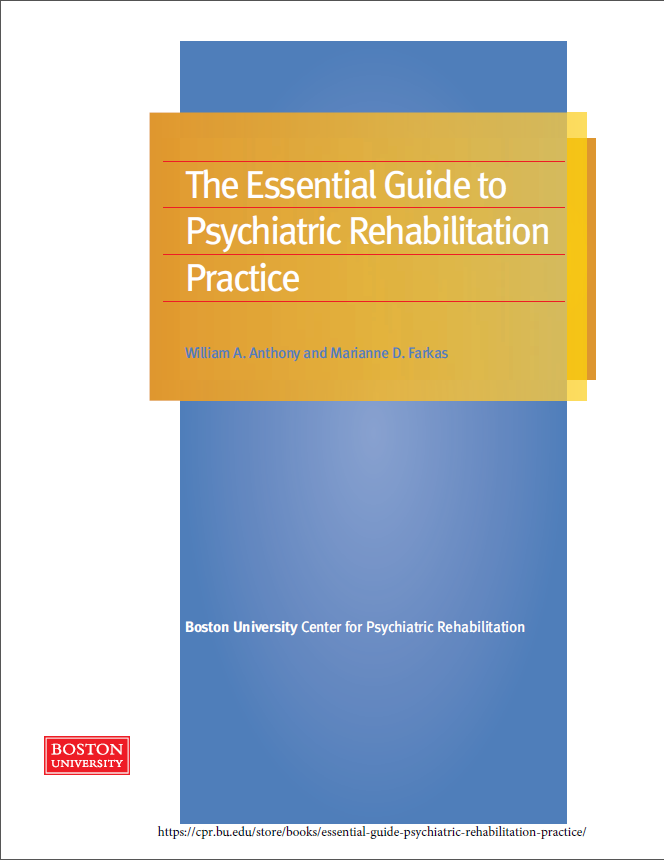The Essential Guide to Psychiatric Rehabilitation Practice
William A. Anthony and Marianne D. Farkas

Book (PDF)
$19.95
The Essential Guide to Psychiatric Rehabilitation Practice
William A. Anthony and Marianne D. Farkas
$19.95
Audience
Recommended for educators, students, practitioners, supervisors, trainers, and consumers—anyone interested in understanding and serving the needs of persons with psychiatric disabilities. Valuable resource for staff development and for classroom use in courses in rehabilitation counseling, psychology, psychiatry, psychiatric nursing, and social work.
Description
In this recovery era, implementing the process of psychiatric rehabilitation has achieved prominence and importance. The purpose of this Guide is to describe the complexities of the psychiatric rehabilitation process, programs, and principles in a most straightforward and user-friendly way, in order to improve the implementation, practice, and study of psychiatric rehabilitation. To advance your understanding of the psychiatric rehabilitation process, the Guide strives to make the major elements of the psychiatric rehabilitation process, programs, and underlying principles perfectly clear.
Features of the Guide include checklists, examples, forms, and key principles that support effective implementation. Regardless of the program model, setting, or discipline; the psychiatric rehabilitation process effectively helps people living with psychiatric disabilities become more successful and satisfied in living, learning, working, and social environments of their choice.
Citation: Anthony, W. A., & Farkas, M. D. (2011). The Essential Guide to Psychiatric Rehabilitation Practice. Boston, MA: Boston University Center for Psychiatric Rehabilitation.
Product Details
PDF file: 73 pages
Published: 2011
ISBN: 978-1-878512-51-2
Table of Contents
Preface
Section 1: Introduction
- Purpose of This Guide
- Intended Audience for This Guide
- Underlying Assumptions of This Guide
- Understanding the Background Psychiatric Rehabilitation
- Psychiatric Rehabilitation Origins
- People Who Use Psychiatric Rehabilitation Services
- Psychiatric Rehabilitation Defined
- Psychiatric Rehabilitation Process Explained
- Psychiatric Rehabilitation Program Models, Settings, and Disciplines
- Psychiatric Rehabilitation Principles
- The Impact of Psychiatric Rehabilitation on the Mental Health Field
- Differentiating Psychiatric Rehabilitation Services from other Mental Health Services
- Psychiatric Rehabilitation as an Evidence-Based Process
- The Critical Nature of the Helping Relationship
- The Psychiatric Rehabilitation Process and Medicaid
- The Psychiatric Rehabilitation and Health Care Reform
Section 2: Process
- Tracking the Psychiatric Rehabilitation Process
- Keeping Track of the Service Delivery Process
- Benefits in Tracking the Service Delivery Process
- Understanding the Service Delivery Process
- The Diagnosis-Planning-Intervention (DPI) Process of Psychiatric Rehabilitation
- An Example of Tracking the Psychiatric Rehabilitation Process
- How Detailed Must the Tracking Be?
- What about the Level of Specificity of the Intervention Itself?
- Tracking DPI Service Processes for Different Services
- Common DPI Activities across Service Processes
- Recording the Psychiatric Rehabilitation Process
- The Importance of Record Keeping
- Differences Between Tracking and Record Keeping
- How Detailed Must the Record Keeping Be?
- Recording the DPI Phases of the Psychiatric Rehabilitation Process
- Record Form for Assessing and Developing Readiness in the Psychiatric Rehabilitation Diagnostic Phase
- Record form for Setting an Overall Rehabilitation Goal in the Psychiatric Rehabilitation Diagnostic Phase
- Record forms for Functional and Resource Assessments in the Psychiatric Rehabilitation Diagnostic Phase
- Record form for Planning and Intervening in the Psychiatric Rehabilitation Planning and Intervention Phases
- Summary of the Psychiatric Rehabilitation Process
Section 3: Programs
- Fundamental Program Elements
- Program Mission
- Program Structure
- Program Environments
- Examples of Program Models
- ACT Program Model
- Clubhouse Program Model
- Individual Placement and Support (IPS) Program Model
- Choose-Get-Keep Program Model
- Summary of the Psychiatric Rehabilitation Programs
Section 4: Principles
- Practice Principles
- Recovery Principles
- Research Principles
- Leadership Principles
Authors
Reviews
Currently, there are no published reviews for this book. If you would like to write an endorsement, please send it to: cprbooks@bu.edu


